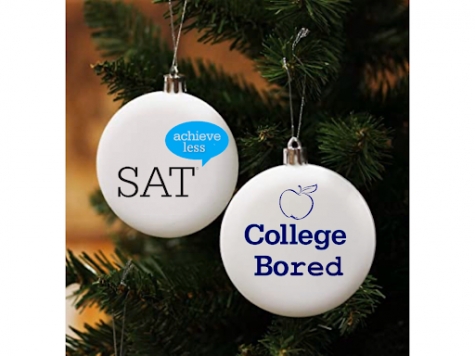What is the College Board really doing with your AP test money?: A Formal Radish Investigation
“The Radish offers satire and parody as commentary and critique on matters of public interest. No article posted on the Radish should be taken literally or viewed as representing truthful statements of the individuals or organizations which may be mentioned in the articles.”
December 7, 2021
In mid-October, upon registering for 2022 AP tests, students were charged a hefty $96 per exam. The College Board justified this cost by stating “education is priceless; good education, on the other hand, involves scamming students.” In recent interviews, they added that 75% of the money goes to maintaining CEO David Coleman’s yearly salary of $6.2 million after he had to temporarily freeze his income due to COVID-19. Nonetheless, their excuses were rather shaky. Thus, The Radish conducted an intense, two-month long investigation of the College Board’s Advanced Placement program and discovered numerous ulterior motives behind the AP exam price tag.
The Origin: Coping with Financial Loss
In the spring of 2020, the University of California schools removed their SAT and ACT requirements due to unnamed “beef with the College Board” over Twitter. This change resulted in a dramatic nationwide increase in the positive mental health of high school seniors, and a corresponding 750% decrease in College Board exam revenue. “I feel manipulated, gaslighted, and, above all, let down by the high school students who won’t take five hours out of their Saturday to fill in a scantron sheet if they are not required to,” states a College Board exam curator who quit after the company stopped paying for its employees’ Starbucks runs. The higher-ups in the company nearly walked out when the lack of profits meant they could no longer ride a party bus to work, and a rumor echoed that Coleman considered registering himself as a student and taking the SAT 40 times to start up the flow of income again. Fortunately, the profits from the 2022 AP exams filled this economic void, with leftovers to spend on revamping the company through the following actions:
Hiring a Team of Russian Hackers to Remove AP Memes from Twitter
The College Board has relentlessly attempted to stop the rapid production of PSAT and AP exam memes by requiring students to pledge not to share test information before taking any exam. Shockingly, this effort has been a massive failure. An anonymous College Board representative commented, “We considered rewriting the pledge in simpler terms: instead of some gibberish about ‘no cheating’ we would replace it all with ‘If you guys don’t cheat we’ll follow you back on Instagram.’ However, we knew we had to make a bigger move, so we hit up our Russian hacker friends.” The College Board has publicly mentioned their ties to ambiguous “illegal technological geniuses” before, yet they plan to use the profit from the increased AP exam cost to hire those with the utmost experience in breaking through secured government databases. “We need the best in the technological industry when it comes to hacking our students’ twitter accounts,” stated College Board CEO David Coleman in a September 2021 press conference.
Funding New, 100% Memorization-Based AP Courses
To resolve their economic crisis, the College Board is expanding on its one lucrative component: AP courses. Starting as early as fall 2022, several new, purely memorization-based AP courses and exams will be introduced for those students looking to earn AP designation without the grueling work of learning. Each course requires a rapid memorize-and-spit-it-back-out-on-a-test mentality, ensuring that every student will score a 5 on their exam (assuming they know how to use flashcards). Courses include but are not limited to:
AP Multilingual Alphabet: An AP International Language course in which students memorize the traditional alphabet in over 120 languages ranging from French to Euskara, one of the oldest languages found in the European region. Course expected to launch in the fall of 2023.
AP Pi Memorization: For the math geniuses, or those who hate themselves, AP Pi Memorization is a College Board mathematics course requiring students to remember all 62.8 trillion decimals of Pi. The AP exam is split up into an oral test and a written essay, both consisting of reciting Pi in its entirety. Course is available for enrollment in the 2022-2023 school year.
AP Personal Information Memorization: Self-explanatory, this AP course is designed for practical thinkers, or slackers who can’t handle AP Pi Memorization, and expects students to remember and recite the numbers seen on their credit or debit card, their parents’ bank account number, their social security number, their insurance number, and so on. Course is currently pending approval from the US Department of Homeland Security.
David Coleman summed up the practicality of these APs in his comment, “Albert Einstein said it best, ‘the true sign of intelligence is not knowledge but the ability to remember every single event in American history that occurred in 1789’ and here at the College Board, his words are the inspiration for our new AP Memorization courses.”
College Board Merch Drop

Due to popular demand, the College Board recently announced a merch drop set to be released in the 2021 holiday season. The collection, entitled AP Design, includes sweaters, mugs, blankets, masks, tapestries, car seat-covers, throw-pillows, and Christmas ornaments (limited time only). Merch ranges in price from $80 for authentic marble College Board coasters to $899 for a College Board bedding set. Students are encouraged to purchase merch, and starting in the 2022-2023 school year, the purchase of at least one item from this collection will be required to earn AP designation on one’s transcript (in addition to taking the exam).


Concluding Findings:
Some students suspect the College Board to be a largely funded scamming organization, others simply state it is the pinnacle of prestige in international education. At the end of the day, it is up to the individual to take the facts uncovered by the Radish Formal Investigation team to formulate their opinion.






